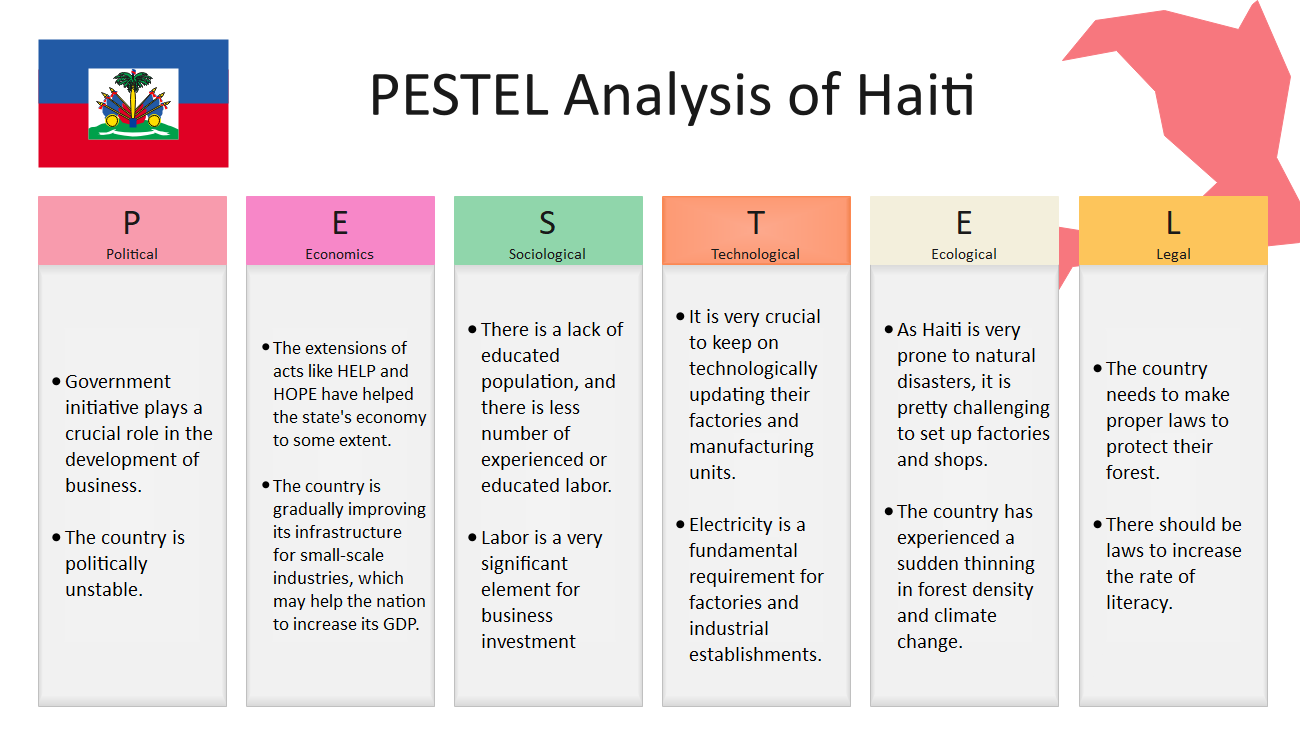Haiti PESTEL Analysis

1. Introduction
The PESTEL analysis is a tool that allows an individual to find out how a country or industry can get affected when there are specific changes in the external conditions like their politics, economy, sociology, technology, ecology, and law. Some of the features directly impact their system, while some may show some minor and indirect effects. Haiti is a country in the Caribbean Sea and has a free market economy. It is one of the poorest countries in America, and its vulnerable conditions make it a country less likely to get investments. Haiti PESTEL analysis can see how the nation is affected by external conditions.
2. Background of Haiti
It is essential to know about the country’s background to conduct a PESTEL analysis. Haiti is the third-largest country in the Caribbean Sea and is highly dependent on natural resources, external aids, and contracts with other countries. It has a GDP of $19.97 billion and has a free market economy. The country lacks infrastructure, which makes it a less likable choice for investors from foreign countries.
3. Haiti PESTEL Analysis
The PESTEL Haiti can help an individual to identify the situations which can impact Haiti’s development. It can help them discover the ways for their growth while cushioning the vulnerabilities. Adversities that they may encounter in the future.
Political Factors:
For any business to flourish, a stable political scenario is a preliminary requirement. If there is war or other political conditions, the land may not be a good choice for the businesses. Here are some political conditions which is the reason for Haiti’s present economic condition:
- Government initiative plays a crucial role in the development of business. The Michael Martelly administration's initiatives in 2011 will bring in more foreign investment to ensure the sustainability of Haiti.
- The country is politically unstable. The administration of the nation is not very interested in managing natural resources. This lack of management is why the state fails to use its resources for socio-economic development.
- The country is also witnessing climate change leading to a decrease in the production of their natural resources. The government needs to make policies to take care of this situation to cope with it in the long run.
Economic Factors:
Economic conditions of a country directly impact its development. Haiti is experiencing an increase in its GDP, which indicates its developing economic condition. PESTEL Haiti can show how economics affect its status:
- The extensions of acts like HELP and HOPE have helped the state's economy to some extent. After the 2010 earthquake, Haiti's economy is gradually improving, which has resulted in increased revenue for the government.
- The country is gradually improving its infrastructure for small-scale industries, which may help the nation to increase its GDP.
- The country has a free market and is rich in natural resources. Haiti is also successfully improving its GDP after the 2010 earthquake. If the state can develop its infrastructure, it may make room for new investments.
Social Factors:
Sociological condition of any country directly impacts its economy and infrastructural development. Here are some sociological conditions which can work on the growth of Haiti:
- There is a lack of educated population, and there is less number of experienced or educated labor. It makes it highly difficult for the business to find expert employees in the country.
- However, Haiti has a massive population. Thus, making it easier for businesses to get more labor at a low price. Labor is a very significant element for business investment, and hence low labor cost makes it a good choice for some businesses.
- As farming is the main livelihood of the people of this country, to increase the agricultural field people, have cut down the trees at a rapid rate. This deforestation has affected the timber industry of the country.
Technological Factors:
For infrastructural development, it is crucial to have technical aid. PESTEL Haiti can show how its lack of technological development has affected its growth :
- For businesses, it is very crucial to keep on technologically updating their factories and manufacturing units. Haiti lacks infrastructural development, and hence it is difficult for the industries to establish hi-tech factories.
- Electricity is a fundamental requirement for factories and industrial establishments. The country has pretty unstable electricity connections. Thus, the larger businesses may not feel interested in investing in Haiti.
- Since the place often gets destroyed by disasters, it is not easy for the industries to use upgraded systems. It may not be cost-efficient to invest in an earthquake-prone zone. The 2010 earthquake in Haiti destroyed its capital entirely.
Environmental Factors:
As Haiti is a country that is very near to water, it can severely impact the condition of the land. Most people of the land are dependent on its natural resources. Hence, ecological change can affect their economy and overall development. Here is how ecological chance can toll upon their growth:
- As Haiti is very prone to natural disasters, it is pretty challenging to set up factories and shops. With each calamity, the companies need to spend some amount on compensating the loss due to disaster.
- The country has experienced a sudden thinning in forest density and climate change. It has hampered its timber industry as well as the natural resources of the country.
- The country is rich in natural resources, and for its location, it is ideal for pisciculture. Haiti has a strong fishery industry which contributes to its economy.
Legal Factors:
Legal structure of a country can have a considerable impact on its conditions. PESTEL Haiti can show how legal changes can contribute to the country’s development:
- The country needs to make proper laws to protect their forest. As the tendency of deforestation is increasing among the people, this may be a leading cause of the sudden climate change. There must be strict laws to prevent this destruction of natural resources.
- There should be laws to increase the rate of literacy. It can create a more learned generation who can contribute to the expert employees for businesses.
- The charcoal use of the country is increasing at a rapid rate as well. Charcoal combustion is one of the main reasons for air pollution. To keep the use of charcoal within check, Haiti needs to implement rules.
4. Key Takeaways
The PESTEL Haiti shows how the country’s geographical location and lack of management resulted in its weakened states. Though the country is gradually developing and has seen a higher GDP in recent years, they need strict laws and proper management to strengthen their economy for further growth.
Use EdrawMax Online to create a PESTEL analysis diagram, or create any other diagram with ease! There are massive PESTEL templates and symbols to choose from, and creating a PESTEL analysis diagram could be really simple. Also, you can find substantial PESTEL templates in our template community to have a quick start. If you want to know more about how to make a PESTEL analysis diagram in EdrawMax Online, just check this PESTEL guide, it may help you to create diagrams without efforts.
5. References
-
Analytics, M., 2021. 'Haiti | Economic Indicators | Moody's Analytics', Economy.com, [online]. Available at: https://www.economy.com/haiti/indicators (Accessed 25 June 2021).











